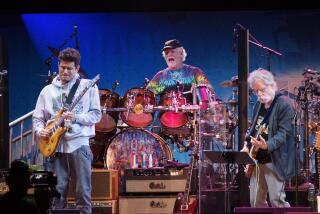Bill Wyman, the Rolling Stones’ ‘quiet one,’ speaks up in a new doc
When bassist Bill Wyman announced to the Rolling Stones that he was quitting at the beginning of the 1990s, the news was received with genuine disbelief. Could he be serious about leaving the widely proclaimed “world’s greatest rock ’n’ roll band”?
With another world tour coming up in 1994, singer Mick Jagger and drummer Charlie Watts decided to investigate. “In the end,” Wyman says now, “Mick and Charlie came around in the evening and had a meal with me and said, ‘Have you left?’ I said, ‘I left two years ago!’ They weren’t very happy about it.” His departure was formally announced in 1993, and he was replaced on the road by touring bassist Darryl Jones.
REVIEW: Doc captures essence of Bill Wyman, the Rolling Stones’ ‘Quiet One’ »
But as Wyman knows, the surviving members of the classic 1962 lineup of the Stones couldn’t fully separate if they tried. For one thing, the stoic bass player was the obsessive, unofficial archivist of the band’s rich history, collecting every poster, handbill, contract, receipt, button, photograph, newspaper clipping, stage costume and the many hours of home movies he personally shot on the road.
Whenever the Stones undertake a major project that looks back through the decades, Wyman gets a call as the only insider who kept a careful record. That same archive is now the foundation of “The Quiet One,” a 97-minute documentary that examines Wyman’s life before, during and after the Stones.
The film premieres June 21 for a weeklong run at the Nuart Theatre (followed June 28 by video-on-demand), just as Wyman’s onetime comrades in the Stones return to their stadium world tour this week in Chicago; they land at the Rose Bowl on Aug. 22.
“I’ve always been so proud of my 31 years in the band and I’m still great friends with the boys,” says Wyman, now 82, on the phone from his London office. “We still send each other birthday and Christmas presents. We see each other socially when it’s possible. It’s a family thing, although it sounds corny. It’s not business anymore.”
Wyman last appeared onstage with the Stones in 2012 for two concerts at London’s 02 Arena to mark the band’s 50th anniversary, where he joined them onstage for a dissatisfying two songs a night. “They wouldn’t let me do any more,” he told the BBC afterward. “It’s very difficult to go back and relive something.”
Directed by Oliver Murray, “The Quiet One” is the most gentle of the many Stones documentaries, opening with Wyman alone at a desk as the camera slowly pans across shelves and boxes loaded with personal treasures and ephemera, each item catalogued and cross-referenced.
Born William George Perks in 1936, Wyman learned statistics, charts and graphs while in the British armed forces, and was the first Rolling Stone to have a home computer — an early Apple desktop brought from the U.S. in 1981.
“He’s a kind of lethal cocktail of incredibly OCD but also a bit of a mad scientist,” Murray, 33, says of the subject of his first feature documentary. “It’s actually quite an emotional experience going in and seeing the archive because he has everything. He always has about 3 or 4 percent of his collection around him because he’s working on it.”
The film gets its title from a popular label that Wyman shared with the equally taciturn George Harrison of the Beatles, and Wyman notes with a laugh that they were frequently mistaken for each other during the British Invasion era. On one trip to New York, he was met outside his hotel by young autograph seekers: “How did they know I was coming? They said, ‘Please sign this, please sign this.’ Initially, I started to sign them and they were Beatles albums. I said, ‘I’m Bill Wyman,’ and they said, ‘No, you’re George!’ We used to laugh about it.”
In the Stones, Wyman was the poker-faced bassist at stage left holding his instrument like a shotgun — pressed close to his chest and tilted skyward. His bass lines were an essential part of the band’s formidable rhythm section of muscle and swing, from his deep, bouncing groove of “19th Nervous Breakdown” to the “walking bass” of the disco-era hit “Miss You.”
The band’s early manager Andrew Loog Oldham notes in the documentary that Wyman had already settled into a normal life by the time the Stones came around. As the band’s oldest member, Wyman was married with an 8-month-old son. He discovered rock ’n’ roll via American Forces Network Radio while stationed in West Germany and bought his first Elvis Presley records there.
As recounted in the film, during his very first meeting with a new band called the Rollin’ Stones, Wyman hit it off with the surly young Londoners after buying everyone a round of drinks.
“They had no money,” says Wyman, who, like Watts and keyboardist/tour manager Ian Stewart, had a real job. “We were buying them fish and chips and cigarettes whenever we got together. That was well appreciated at the time.”
Against the advice of all friends and family, he notes in “The Quiet One,” Wyman joined the Rolling Stones and his life was changed. In the early days of their rise, the Stones were the most notorious, scruffiest band of hit-makers in the U.K., where one tabloid headline famously asked, “Would you let your daughter marry a Rolling Stone?”
The film draws from Wyman’s decades of diaries, the meticulous firsthand account of the band’s story that also provided the excruciating details within his 1990 memoir, “Stone Alone.” “I knew exactly what happened day by day. It wasn’t just hearsay,” he says. “I had the facts. I knew exactly what day and what time, whether it was raining and everything.”
While Jagger and guitarists Keith Richards and Brian Jones faced arrest during that decade of drug experimentation and social revolution, Wyman admits his particular vice was an appetite for sexual conquest that accelerated with the band’s exploding popularity.
Making “The Quiet One” has meant discussing his personal life and darker periods of the band, including the disastrous 1969 free concert at Altamont Speedway in Northern California, which Wyman called “an awful, awful thing to endure”: A concertgoer was stabbed to death in front of the stage during the Stones’ headline set.
He also describes a difficult relationship with his bricklayer father (who took Wyman out of school and put him to work) and speaks about the failures of his first two marriages. In 1989, he married Mandy Smith, who was then 18. Wyman was 52. It was controversial and short-lived. “I was really stupid to ever think it could possibly work,” he admits.
“We all have difficulties in life, don’t we?” he says now. “You just have to ride through them as best we can.” Since 1993, he’s been married to Suzanne Accosta, and together they have three daughters.
Since leaving the band, Wyman has continued to live in the South of France and in London, where he established the Stones-themed Sticky Fingers restaurant in 1989, filling its walls and display cases with a sampling of his memorabilia. He still records and performs with his blues-rock band the Rhythm Kings but also devotes time to his interests in British archaeology, painting and photography.
Along those lines, Wyman takes after his grandmother, who largely raised him in London during World War II and after. She was a gatherer of coins, stamps and the illustrated “cigarette cards” that came with packs of smokes. Wyman continued the archiving tradition, but with the Stones he had a subject of lasting international interest.
“None of us expected the Stones to last more than a couple of years. Neither did the Beatles. Neither did the Animals or the Hollies,” Wyman explains. “I collected those things for my son. When he grew up, I could say I was once in a band and we made a record and we were on the radio or something.”
More to Read
The biggest entertainment stories
Get our big stories about Hollywood, film, television, music, arts, culture and more right in your inbox as soon as they publish.
You may occasionally receive promotional content from the Los Angeles Times.







